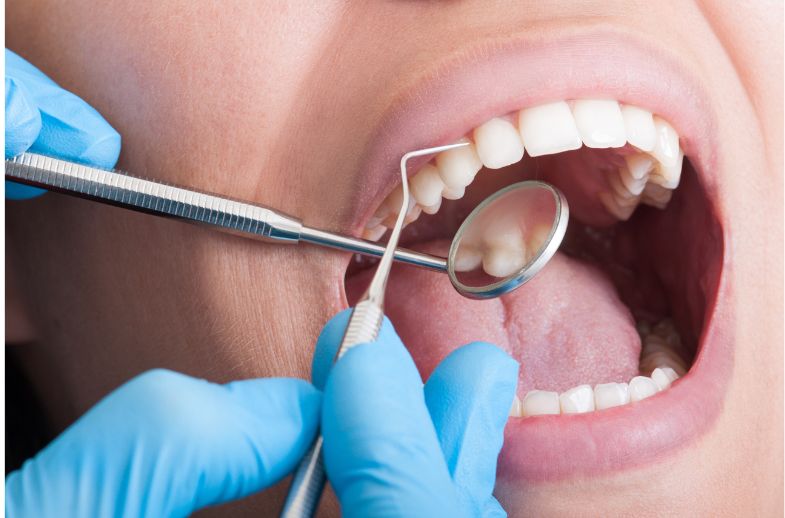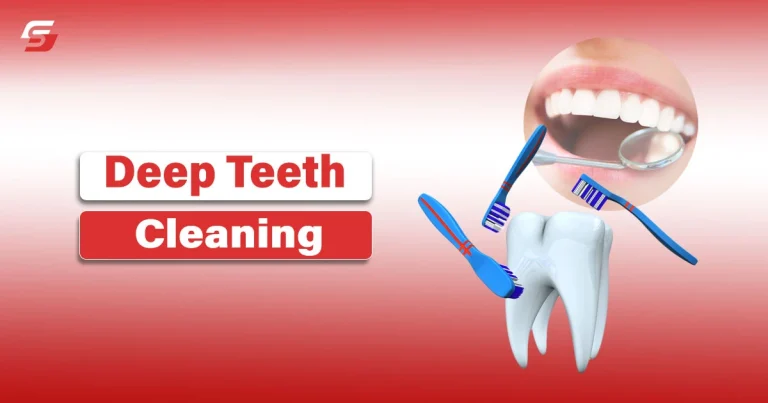We must know about deep cleaning whenever we are suffering with gum disease. Preserving good dental health is essential for overall good health and regular teeth cleanings are important for this goal.
Because the tools are set against your teeth’s roots, below the gum line, the procedure may cause discomfort. A dentist can use a regional anesthetic to numb the wound.
It prevents gum disease from increasing, lowers tooth bleeding and irritation, and prevents further damage and possibly even tooth loss.
In this blog post, we will explain what deep teeth cleaning is, and When Is Deep Teeth Cleaning Necessary and how to maintain our oral health after deep cleaning.
What Is Deep Teeth Cleaning?
This dental procedure cleans teeth by clearing particles, tartar, and bacteria from under the jaw and around the base of teeth. It is generally carried out by a dentist or hygienist in order to fix gum disease, stop additional harm, and contribute to strong teeth and gums.

What Goes into a Thorough Cleaning?
Scaling
During scaling, your dentist will manually remove the plaque of your teeth both above and below the gum line using a hand-held dental scaler. To get rid of tartar, they could also use a water spray and an ultrasonic machine with a metal tip that rotates.
Root Planing
To reduce the possibility of bacteria attaching to the roots of your teeth in the future, root planning involves a rubbing motion to smooth out uneven positions. It eliminates bacteria that are difficult to reach, teeth may sometimes be cleaned with an antibiotic liquid.
Why Is Deep Cleaning Necessary for Teeth?
When routine cleanings are not enough to handle oral health issues or gum recession, deep cleaning is an ideal option. The following are some general causes for which deep cleaning may be needed:
Gum Disorder
This dangerous gum infection has a chance to weaken the soft tissue and bone supporting your teeth. Deep cleaning assists in the control and treatment of this disease by removing accumulated deposits and lowering inflammation.
Plaque and Tartar Deposition
Plaque and tartar can harden and form holes beneath the gum line if they are not removed by regular cleanings. In order to treat these gaps and stop more damage to the teeth and gums, deep cleaning is necessary.
Fresh Breath
Acidity and plaque are carefully removed from your teeth’s surfaces along with the gum ring. Breath feels better because this procedure gets rid of the bacteria’s setting ground.
What Distinguishes Deep Cleaning from Regular Cleaning?
Regarding goals, methods, and scope, regular and deep cleaning are two distinct dental procedures.
Regular Cleaning:
Focuses on cleaning the visible parts of teeth of plaque, tartar, and spots.
Generally done every six months.
Requires scaling and polishing to keep gums healthy.
Function as a preventive step to maintain proper oral health.
Deep Cleaning
Focuses on the elimination of germs, tartar, and plaque on root surfaces and under the gum line.
Commonly recommended for people with gum recession.
Consists of numbing the area, scaling to get rid of viruses and tartar, and root planing to smooth up edges.
Therapeutic approach to stop more harm and cure gum disease that already occurs
How to Maintain Oral Health After Deep Cleaning
After deep cleaning, careful attention is needed to keep dental health by preventing the development of bacteria. Take soft foods, stay away from hard or hot foods, and rinse with warm seawater as soon as possible after treatment.
In the long run, create a regular schedule that includes brushing once a day and brushing twice a day with fluoride toothpaste, ensuring the floss is curled around every tooth.
For places that are hard to reach, think about using dental brushes and antibiotic mouthwash. It is vital to get dental exams every three to four months to track gum recession, sensitivity, and to treat any issues.
Improving dental health also involves cutting less on sweet and acidic meals, giving up tobacco use, and changing your toothbrush every three to four months.
Conclusion
Deep cleaning of teeth is needed for more serious oral health issues such as gum illness and large plaque accumulation. It is different from regular cleanings in that it goes longer and covers more ground, however, it is still essential to maintaining the best possible oral health.
You can contribute to protecting your teeth and gums free of illness and health by knowing why and when deep cleaning is necessary and by taking the proper actions to take care of them after therapy.
Talk with your dentist about the best plan of action for your unique needs if you’re worried about the state of your teeth or believe you could benefit from a deep cleaning. Hope this article will help you in better understanding.










